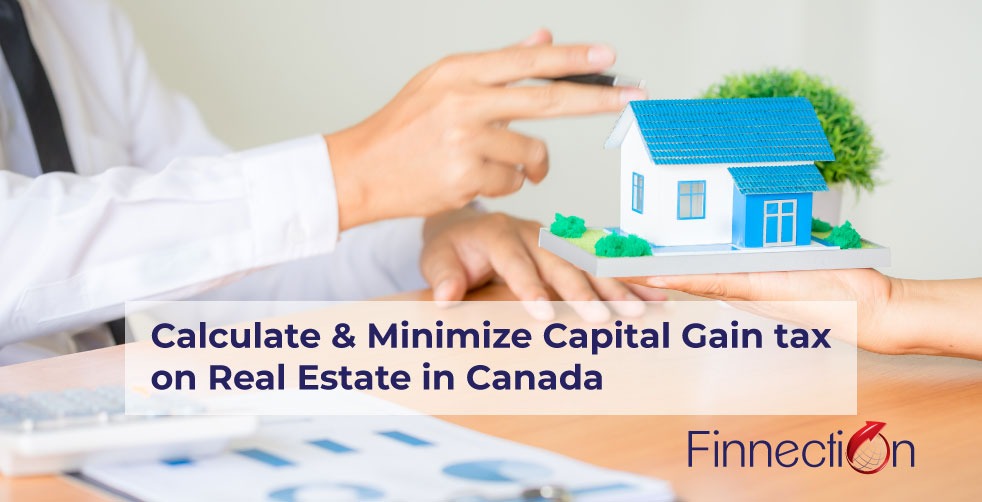Calculate & Minimize Capital Gain tax on Real Estate in Canada
What exactly is a capital gain or loss?
Selling a capital asset or an investment and the proceeds of the sale exceed the fitted cost base of the asset, capital gain is incurred. On the other hand, if the earnings are less valuable than the adjusted cost base than it is capital loss.
Capital losses are not subject to taxation, and are only applicable to non-assets, like land, shares or other investments.
Capital gains on the other side are added to taxable income at half (50 percent) of the sum of the gain.

What exactly is capital property?
Capital Property is basically your capital assets that are subject to Capital Gains Tax include buildings, land, cottages or equipment you use for a business, shares, bonds and mutual fund trust units.
In Canada, how are capital gains taxed?
The capital gain should be included in the yearly income tax return and is taxable a percentage of that benefit, which is termed as the inclusion rate.
Inclusion rate of capital gain is 50% in Canada. When the capital asset is sold for more than it buying money paid for, the CRA applies a tax on half (50 percent) of the capital gain amount. Tax is imposed on the basis of tax bracket and province of residence.
In Canada, how is capital gains tax calculated on real estate?
As per CRA, in order to determine the capital gains tax, you need to identify the following amounts:
- The proceeds from the sale
The amounts of disposition are the funds received after you sold your property.
- Cost Base Adjustment (ACB)
The amount spends by the user to buy the capital property, its also includes the cost spent for the ownership period, renovations and to acquire the property is known as adjusted cost base.
- Expenditures and overheads incurred in order to sell the property
These are the expenses you incurred in order to dispose of the property. It Includes any legal fees, commission on selling, fees of surveyors, fixing-up fees, finders’ fees, brokers’ fees, advertising costs and transfer taxes.
As an instance, suppose you made a $20,000 capital gain. According to the inclusion rate, 50 percent or half of that is subject to taxation which is $10,000. The tax rate would’ve been calculated as per the individual’s tax bracket as well as the province of residence.
Minimize Your Capital Gains Tax in Canada on Real Estate
However, the inclusion percentage remains same for anyone, there are other ways to reduce the amount of tax on your capital gains.
For renting a property chek out this article.
- Right selling time of investments and properties
Tax can be minimized by selling a property at the right time. For Example, if your sale has derived a profit, you could perhaps delay the sale till January 1st of the first year. This will in turn impose the capital gains tax that year but then have to pay by April 30th of the next year.
If you have varying earnings, you can save your money by selling a capital asset at that time when your income is low. Capital gain tax can also be avoided on residential properties by showing it as your primary residence.
- Giving Away Assets
For charity purpose or want to financially help any family member, capital gain tax can be reduced by using donations or gifts.
- Gain vs. Loss in Capital
When you sell your non-depreciable property less than the adjusted cost base, capital loss is incurred.
Presents to your relatives may trigger capital gains tax as CRA deems a gift subject to tax disposition of an asset. You can still save money by gifting an asset that has derived loss and you want to keep it due to emotional significance to the family. You can use this capital loss to modify your other investment income, whereas your family members will have the benefit of maintaining the shares.
- Reserve for Capital Gains
In Canada, Capital gain tax can be postponed on real estate. Capital gain tax need to be reported in income tax returns even though you sold your property in instalments. By using capital gain reserve, capital gain tax can be postponed up to 5 years. If the future taxable income falls under lower tax brackets than this is very beneficial resulting in a lower tax rate.
For leasing or buying a property check out our detailed article about buying or leasing asset.
For more details about capital gain tax on real estate in Canada, contact finnection via email at info@finnection.ca or call us at (647) 795-5462
Disclaimer: Above information is subject to change and represent the views of the author. It is shared for educational purposes only. Readers are advised to use their own judgement and seek specific professional advice before making any decision. Finnection Inc. is not liable for any actions taken by reader based on the information shared in this article. You may consult with us before using this information for any purpose.
